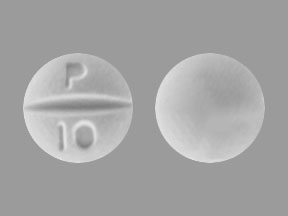Pindolol Side Effects
Medically reviewed by Drugs.com. Last updated on Dec 12, 2024.
Applies to pindolol: oral tablet.
Precautions
It is very important that your doctor check your progress at regular visits to make sure this medicine is working properly and to check for unwanted effects .
Pindolol may cause heart failure in some patients. Check with your doctor right away if you are having chest pain or discomfort; dilated neck veins; extreme fatigue; irregular breathing; an irregular heartbeat; shortness of breath; swelling of the face, fingers, feet, or lower legs; weight gain; or wheezing .
This medicine may cause changes in your blood sugar levels. Also, this medicine may cover up signs of low blood sugar, such as a rapid pulse rate. Check with your doctor if you have these problems or if you notice a change in the results of your blood or urine sugar tests .
Make sure any doctor or dentist who treats you knows that you are using this medicine. You may need to stop using this medicine several days before having surgery .
Serious side effects of pindolol
Along with its needed effects, pindolol may cause some unwanted effects. Although not all of these side effects may occur, if they do occur they may need medical attention.
Check with your doctor immediately if any of the following side effects occur while taking pindolol:
More common side effects
- swelling of the face, fingers, feet, or lower legs
Less common side effects
- burning, crawling, itching, numbness, prickling, "pins and needles", or tingling feelings
- chest pain
- difficult or labored breathing
- shortness of breath
- tightness in chest
- wheezing
Rare side effects
- decreased urine output
- dilated neck veins
- extreme fatigue
- fast, irregular, pounding, or racing heartbeat or pulse
- irregular breathing
- seeing, hearing, or feeling things that are not there
- troubled breathing
- weight gain
Get emergency help immediately if any of the following symptoms of overdose occur while taking pindolol:
Symptoms of overdose
- blurred vision
- dizziness
- headache
- nervousness
- pounding in the ears
- slow heartbeat
Other side effects of pindolol
Some side effects of pindolol may occur that usually do not need medical attention. These side effects may go away during treatment as your body adjusts to the medicine. Also, your health care professional may be able to tell you about ways to prevent or reduce some of these side effects.
Check with your health care professional if any of the following side effects continue or are bothersome or if you have any questions about them:
More common side effects
- joint pain
- muscle pain
- sleeplessness
- trouble sleeping
- unable to sleep
- unusual tiredness or weakness
Less common side effects
- itching skin
- muscle cramps
- nausea
- stomach soreness or discomfort
- unusual dreams
- weakness
Rare side effects
- rash
See also:
For healthcare professionals
Applies to pindolol: compounding powder, oral tablet.
Cardiovascular adverse events
- Common (1% to 10%): Edema
- Uncommon (0.1% to 1%): Heart failure, palpitations
- Frequency not reported: Bradycardia, slowed AV-conduction or increase of an existing AV-block, hypotension, heart failure, cold and cyanotic extremities, Raynaud's phenomenon, increase in intermittent claudication, conduction disorder, cardiac arrhythmia[Ref]
Endocrine
- Frequency not reported: Hypoglycemia[Ref]
Gastrointestinal
Genitourinary
Musculoskeletal
- Very common (10% or more): Muscle pain (10%)
- Common (1% to 10%): Chest pain, joint pain, muscle cramps[Ref]
Nervous system
- Very common (10% or more): Dizziness (up to 11%)
- Common (1% to 10%): Paresthesia
- Frequency not reported: Headache
- Postmarketing reports: Tremor[Ref]
Respiratory
- Common (1% to 10%): Dyspnea
- Postmarketing reports: Bronchospasm[Ref]
Dermatologic
- Common (1% to 10%): Pruritus
- Uncommon (0.1% to 1%): Rash
- Frequency not reported: Hyperhidrosis, worsening of psoriasis, erythematous rashes[Ref]
Ocular
- Frequency not reported: Impaired vision, dry eyes, keratitis, conjunctivitis[Ref]
Other
- Common (1% to 10%): Fatigue, weakness[Ref]
Psychiatric
- Very common (10% or more): Insomnia (10%)
- Common (1% to 10%): Nightmares
- Uncommon (0.1% to 1%): Hallucinations
- Frequency not reported: Psychosis, confusion, sleep disturbance, depression[Ref]
References
1. Cerner Multum, Inc. "UK Summary of Product Characteristics."
2. Cerner Multum, Inc. "Australian Product Information."
3. (2016) "Product Information. Pindolol (pindolol)." Par Pharmaceutical Inc (formerly Qualitest Pharmaceuticals Inc)
More about pindolol
- Check interactions
- Compare alternatives
- Pricing & coupons
- Reviews (3)
- Drug images
- Dosage information
- During pregnancy
- Drug class: non-cardioselective beta blockers
- Breastfeeding
- En español
Patient resources
Other brands
Professional resources
Related treatment guides
Further information
Pindolol side effects can vary depending on the individual. Always consult your healthcare provider to ensure the information displayed on this page applies to your personal circumstances.
Note: Medication side effects may be underreported. If you are experiencing side effects that are not listed, submit a report to the FDA by following this guide.

